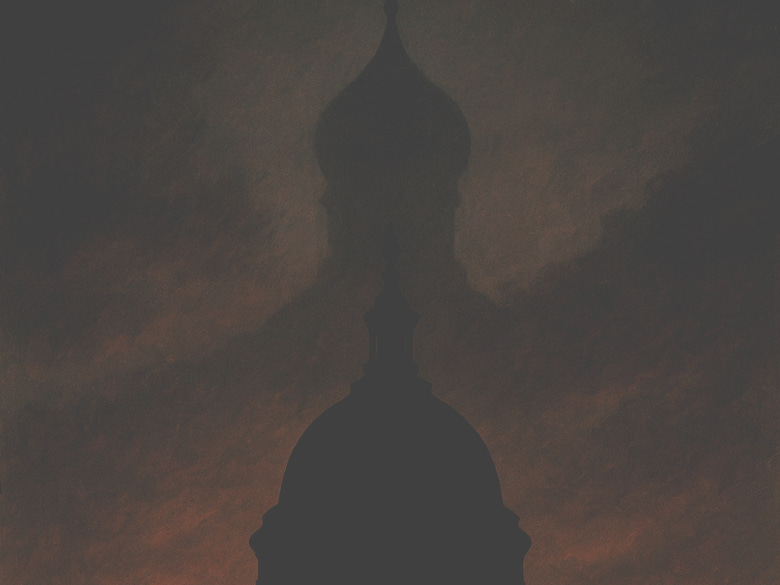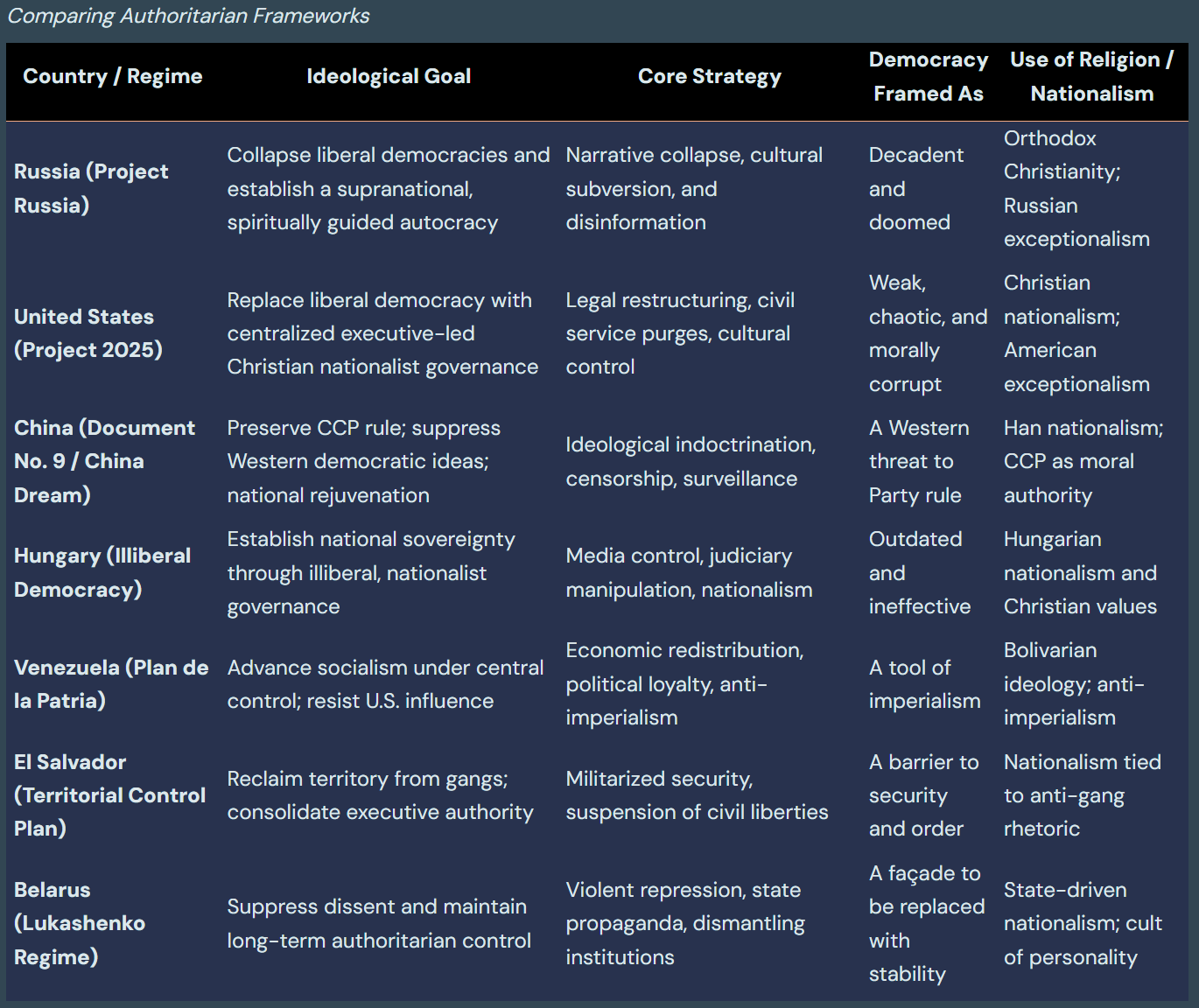Foreshadowed
How a Forgotten Russian Manifesto Helps Explain the World We’re Living In
🔥 Embers — Warmth for the long winter
It started quietly. No headlines. No press tour. Just four books, published in Russia between 2005 and 2010, and sent—by mail—to government officials, ministers, and cultural leaders. Their title was simple: Project Russia.
Inside was a blueprint. One that claimed the West was hollow. That democracy was a failing experiment. That liberal societies were built not on freedom, but on lies—and that their collapse was both necessary and inevitable.
The books didn’t suggest war. Not at first. They called for something slower. Something subtler.
Undermine trust. Accelerate confusion. Hollow out belief in the systems people once defended. Replace debate with performance. Truth with spectacle. Fatigue with silence.
Then—when people no longer recognize the world they live in—offer them a savior.
Not a president. A Prince.
Not elected. Anointed.
It would be easy to laugh it off—if the past two decades didn’t look so much like the pages of that plan.
So the question isn’t whether this was a warning.
The question is: Was it a rehearsal?
A Blueprint for Collapse and Control
The author’s name was eventually revealed—Yuriy Shalyganov, a wealthy businessman with ties to Russian intelligence and the Orthodox Church. But even then, he insisted this wasn’t just his idea. It was a collective vision. A mission, not a manuscript.
The books don’t argue that democracy is flawed. They argue that it’s a scam.
According to Project Russia, democratic nations offer only the illusion of choice. Their elections are shallow. Their freedoms are hollow. Their cultures are fragmented by design. People aren’t liberated, the authors claim. They’re distracted. Dazed. Numbed by consumerism and “tolerance” until they forget what it means to believe in anything at all.
And when a people forgets what it stands for, it becomes easy to tell them who they should follow.
Project Russia names that leader: the Prince-Monk.
A ruler not chosen—revealed. A man of spiritual strength and political clarity. A father. A judge. A savior. Someone to stand at the top of the pyramid and bring order to the “kindergarten” of the modern world.
But there’s a catch....
Before the Prince can rise, the old world has to fall.
The West must fracture. Its alliances must crumble. Its citizens must lose faith in institutions, in facts, in each other.
Not through bombs. Through stories. Through algorithms. Through exhaustion.
The books don’t call it war. They call it strategy.
Undermine belief. Stir confusion. Amplify chaos. Then offer certainty. Offer strength. Offer a return to something sacred—even if it means surrendering the very freedoms you once thought mattered.
That’s the blueprint.
And it didn’t stay locked in Moscow.
The Playbook Isn’t Just Russian
Project Russia wasn’t the first plan to call for a world remade in the image of power. And it hasn’t been the last.
In 2023, a coalition of U.S. policy architects released Project 2025—a 900-page plan to transform American government.
On paper, it reads like a transition guide for a future presidential administration. But in practice, it proposes something far more permanent: the dismantling of democratic safeguards and the centralization of power into one executive figure.
It doesn’t whisper. It says the quiet part out loud.
It calls for purging the civil service. Ending independent agencies. Replacing public servants with loyalists. Defunding public education that doesn’t align with a singular moral vision. Gutting protections for dissent, identity, and privacy—all in the name of “order.”
It’s not a Russian document. But it speaks the same language:
Democracy is broken. Morality must be enforced. Strong hands must prevail.
And it’s not alone…
In China, the Communist Party’s Document No. 9 warns against universal values, civil society, and independent journalism. Its message: dissent is danger, and loyalty must be total.
In Hungary, Viktor Orbán openly rejects liberalism. He calls his model “illiberal democracy”—where media is controlled, courts are stacked, and culture is molded into obedience.
In Venezuela, the Plan de la Patria promotes permanent one-party rule under the banner of revolutionary justice—while opposition voices vanish from public life.
In El Salvador, sweeping security crackdowns have been used to centralize power and jail thousands without trial. A digital generation cheers, while constitutional limits are rewritten in the background.
Different countries. Different ideologies. But the pattern is clear.
Call it a plan. A strategy. A vision.
It’s the same story told in different languages: Let democracy unravel. Then promise to fix it with something stronger.
The Signs at Home
Here in the United States, we’ve grown used to chaos. We scroll through it. Meme it. Argue with it. Mourn it. Normalize it.
But somewhere along the way, something deeper began to change.
Truth stopped being shared. Outrage became a business model. Public trust—once assumed—started to fracture.
And quietly, steadily, the groundwork was laid.
Policies started rolling back voting rights—not with sirens, but with signatures. Agencies meant to protect the public were gutted. Public education became a battleground. Surveillance crept in through data trails and platform agreements. Courts grew quieter in the face of executive overreach.
In 2025, an executive order was issued—framed as “election integrity.” But its real function was restriction: new ID barriers, proof-of-citizenship requirements, purges of voter rolls, and a rollback of registration access for veterans, the elderly, and low-income communities. (Preserving and Protecting Power: What the 3/25 Executive Order Means.)
No troops. No cops. No announcements. Just a new normal.
This isn’t about party. It’s about pattern.
We’ve entered a moment where power is testing its limits—and finding fewer and fewer boundaries.
Strongman politics isn’t a foreign import anymore. It’s been translated into our institutions, our news cycles, our apps. It’s sold as tradition. Packaged as morality. Marketed as strength.
And behind it all is the same logic we’ve seen elsewhere:
If people stop trusting democracy, they’ll settle for control.
They’ll call it safety. They’ll call it stability.
They’ll call it anything but what it is.
A Sacred Figure for a Secular Collapse
In the world imagined by Project Russia, the answer to democratic decline isn’t reform. It’s revelation.
The books describe a ruler who rises not from elections, but from conviction. A man of divine purpose and political power. A “Prince-Monk.”
This figure isn’t just a king. He’s a spiritual anchor. The one who ends confusion, restores order, and speaks with moral clarity when the world no longer knows what to believe.
It’s a fantasy of certainty. And it’s catching.
Today, we see this archetype echoed in different forms:
In leaders who present themselves as God’s chosen.
In movements that fuse political loyalty with religious belonging.
In public figures elevated beyond criticism—because to question them is to question the “truth” itself.
This isn’t unique to any one party or country. It’s a shape that power takes when people are tired. When systems feel broken. When the noise becomes unbearable.
That’s when the promise of a single voice, a singular truth, starts to feel like relief.
And that’s the danger.
Because in the collapse of pluralism, what we lose isn’t just debate. It’s discernment. It’s the ability to recognize manipulation, to resist spectacle, to tell real strength from performance.
The Prince-Monk doesn’t arrive in robes. He arrives in moments of doubt—when people stop asking questions and start begging for answers.
Resistance Begins with Memory
We’re not powerless.
But power wants us to feel that way.
It wants us numb, cynical, exhausted. It wants us to mistake awareness for action. To scroll instead of organize. To repost instead of repair. To react instead of remember.
Because memory is dangerous.
Not nostalgia. Not selective remembering. But real memory—the kind that sees patterns. The kind that notices when history is being rewritten. The kind that connects what’s happening now to what’s come before, and says: I’ve seen this. I know what this is.
That’s where resistance begins.
Not in viral outrage. Not in perfect messaging. But in the refusal to forget.
To remember how disinformation spreads. How freedoms shrink quietly. How the most dangerous shifts are often framed as “security,” “tradition,” or “common sense.” To remember that we’ve faced this before—and that people have resisted before.
Not by yelling louder.
By building slower. By telling better stories. By refusing to let exhaustion become silence.
Never forget—freedom doesn’t vanish all at once. It unravels. One policy. One platform. One manipulated story at a time.
But that also means it can be rewoven. One connection at a time. One community. One reclaimed narrative.
This isn’t just about politics. It’s about practice.
We choose what to carry forward.
And what to leave behind.
It Doesn’t End Here. It Begins With Us.
If Project Russia imagined how the world could fall apart, our task is something different.
To imagine how it can be held together.
To decide what still matters.
To ask, again and again: What do we refuse to forget?
We don’t need to match their spectacle. We don’t need to out-shout their algorithms. What we need is slower. Quieter. Harder to sell. And far more durable.
We need shared memory.
Shared clarity.
Shared refusal.
The people who wrote these blueprints—whether in Moscow or Washington or Budapest—believe that freedom is weak. That truth is fragile. That democracy is too slow to save itself.
They’re betting that we’ll give up.
That we’ll scroll past the signs. That we’ll get tired before we get organized.
But we’re still here.
Still remembering.
Still choosing.
Still writing something else.
And if we’re lucky—or maybe just stubborn enough—what we write next might be harder to erase.
You are the Signal. Keep your torchlight burning.
Learn More
Corum, Lynn. "Project Russia: The Bestselling Book Series of Putin's Kremlin." South Central Review 35, no. 1 (2018): 74–100. https://www.jstor.org/stable/26499841JSTOR
Troy, Dave. "Project Russia: Unknown in the West, Reveals Putin’s Playbook." Washington Spectator, December 12, 2024. https://washingtonspectator.org/project-russia-reveals-putins-playbook/
Harker, Joe. “Anonymous Claims Trump, Musk, and Putin Are Part of a Global Plan to Undermine Democracy.” LADbible, March 27, 2025. https://www.ladbible.com/news/us-news/donald-trump-elon-musk-vladimir-putin-anonymous-warning-639055-20250327
Explore more from Torch & Tinder Press
📣 Signal Dispatch — Signals from the field
🔧 Torchlight Praxis — Tools you can carry
🔥 Embers — Warmth for the long winter (you’re here)
Stay connected: Instagram · Bluesky · Facebook
Support & community editions: Ko-fi





